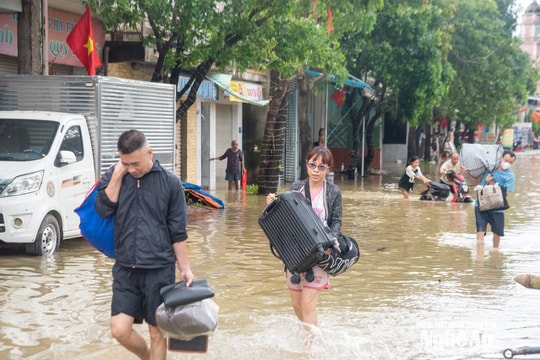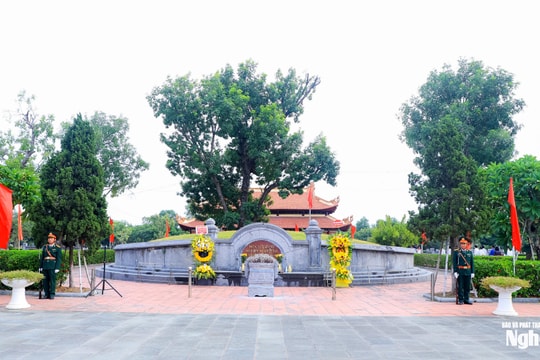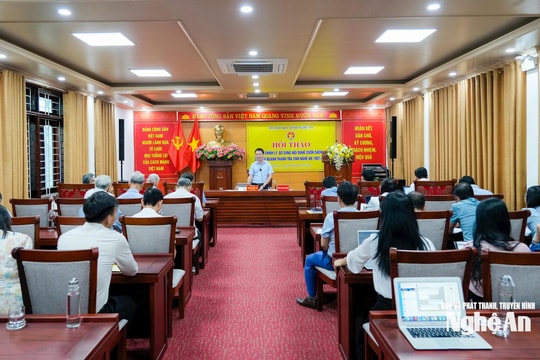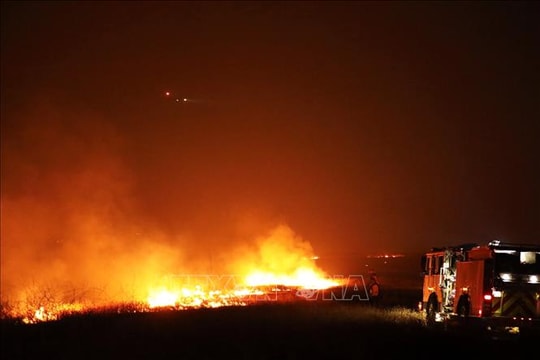Memories of Nghe Tinh land: "The painful but heroic years"
(Baonghean.vn) - Poet Tran Kim Anh always has special feelings for his homeland Nghe An with haunting memories of Nghe Tinh land during the resistance war against the US to save the country.
Poet Tran Kim Anh is from Ha Tinh, currently living in Hanoi. She spent many years in Vinh city during the war. She worked as a teacher, but later pursued a career in literature with all her passion and concern and also won many awards... We had a conversation with her about her memories of her hometown.
-Dear poet Tran Kim Anh, as a native of Duc Tho (Ha Tinh), growing up in the context of a country at war against American imperialism, it is known that during those years of bombs and bullets, you have many memories in Vinh town and it is an indelible part of your memory, a source of material for your compositions. Can you recall those years?
- On August 5, 1964, my father took me to Vinh town for the first time. That year, I was just 9 years old. At that time, Vinh town was in a period of fire and destruction. I witnessed the scene of destruction, desolation and death. It was terrible. Everyone in my father's office was ordered to evacuate because that afternoon, American planes bombed the Ben Thuy oil depot. The whole oil depot was burning fiercely and the scene was horrifying. Many people were burned to death, all of them were workers at the depot. Witnessing that scene, I was very scared. As a child, I was panicked because everywhere I looked was desolation, people were running around, evacuating, looking for a safe place to take shelter. Children and the elderly were almost not in such dangerous places. I heard from my father's office that people evacuated to neighboring districts. It was only after a week that I returned to Ha Tinh. I followed my father back and forth between Vinh town and Duc Tho, had to pass Ben Thuy ferry, this was also a stronghold that the American invaders always bombed, extremely fiercely.
Speaking of Ben Thuy ferry, this is also the place where the fierce bombings that the US imperialists dropped took place, in an attempt to cut off the vital traffic artery on both banks of the Lam River. Despite being devastated and bombed with terrible bombs and bullets, Ben Thuy ferry still worked hard day and night to transport people and goods, despite the rain of bombs and bullets. Ben Thuy ferry has never lost its connection, and is always kept open by soldiers, traffic officers, militiamen... who are on duty day and night, performing extremely important tasks amidst the lurking dangers. That is what I witnessed with my own eyes. Until now, every time I remember, I am always grateful to them, those soldiers, those workers - they did not spare their lives, standing in the rain of bombs and bullets to protect the ferry, day and night transporting each shipment of goods and weapons to the South, contributing to the fight against the US to save the country.
-So during those days, besides the fear of devastation and death, what did the little girl Kim Anh think about the war? What were some of the memories of the war that she participated in or witnessed that later left an impression in her writings?
- I remember the first time I followed the young volunteers to Dong Loc Crossroads, I was in 7th grade at the time, I also wanted to join the young volunteers but I was the only one in my family, my parents were government officials, so I couldn't go. I followed the girls to that fire zone, wanting to see their daily work. It was really dangerous, extremely fierce. At the age of seventeen, eighteen, all of them were rural girls, their education was still unfinished, but I don't understand why the girls were so brave, they didn't know what fear was. Clearing mines, filling bomb craters, leveling roads, making live markers in the dark for vehicles to pass... were their daily work. I was in a team with about seven or eight girls of the same age, about 17 or 18 years old. They were very cheerful, singing all day, working hard without ever complaining. Dong Loc T-junction was an extremely fierce road, countless soldiers, drivers, and youth volunteers sacrificed their lives. I also witnessed the scene of convoys passing by, the soldiers from the North, very young, waving and laughing with the youth volunteers, but the vehicles had not gone a kilometer when they were hit by a bomb, and they sacrificed their lives before they could reach the battlefield.
Many of my friends wrote applications to join the army, the boys in my class and other classes volunteered to go to the battlefield with a determined and enthusiastic spirit. My friends said that they could not study at home when the battlefield was calling. They had to go for the national cause, and if they survived, they would return to study later. The youth at that time were ready to volunteer, be generous, and fiercely patriotic like that. I still remember clearly a friend of mine, Phan Dinh Linh, before going to the battlefield, he said, "First is green grass, second is red chest. I go to fight and then I will come back to continue studying. You guys at home study well, be a solid rear for us. We will definitely return." But after he had been in the war for 2 years, we received the news that he had died in the Southeast battlefield. My classmates sacrificed a lot, it was so heartbreaking! They left when they were in their twenties, not yet in love, not yet finished school... everything was waiting for them. But, during the war, very few people returned intact. Many of my friends' generation remained on the battlefield.
- And how did you put those years and those emotions into the epic poem "Singing with the Border"?
-“And war/ war has been going on for generations from the North and the West/ our ancestors held weapons but never brought peace to the nation/ when did war start? Oh my age!/ war splits the Ben Hai River in two/ war spreads throughout the country, Ben Thuy makes the sky of the Central region ache/ the sky of smoke writhes in sorrow/ pity for the factories, roads, schools, all become pitiful bomb craters/ the little child leans over the body of his mother/ the little child turns to ashes and stains the student's notebooks”.These are the verses that I wrote in extreme pain when I remembered the images of my relatives, my father, my husband's brother... who sacrificed on the battlefield. All of them were gathered into the emotional flow of the long poem of several thousand verses, I remember them all, without missing any detail. I want to recreate the years of hardship, loss, sacrifice but steadfastness and indomitability. Our people, our compatriots in general and Nghe An, Ha Tinh in particular, suffered so much damage but were extremely brave, steadfast, never surrendering to the enemy. I want to express in my work my gratitude, remembering the great contributions of the compatriots on both banks of the Lam River in the great war of national salvation of our nation.
- Honestly, I was very moved by the verses written about soldiers like this: "Must go, the battlefield took him to battle, he became an artillery soldier guarding the sky/ guarding the Tam Soa bank, Dong Loc junction/ Lam river at night, his comrades went to battle, at the age of twenty/ guarding the girls bathing in the nude, the afternoon forest was fragrant after the day of moving the artillery/ they were swans flapping their wings in him endlessly without words...". I want to know the poet's feelings when writing about them?
- As well as writing about the people, compatriots, soldiers on the front are people I respect and am grateful to. I have relatives who are soldiers on the front, my father, my husband's brother, my classmates... they went to fight for independence for the Fatherland, they sacrificed heroically. Therefore, when I wrote this long poem, the question always echoed in my mind: Have I lived a life worthy of the sacrifices of my relatives? Honestly, every April 30th, I am very moved, I buy offerings and burn incense for my deceased relatives, I remember their contributions and promise myself to live a life worthy of their sacrifices. In the long poem "Singing with the Border", I have encapsulated that spirit and I think that I write for my children and grandchildren to read and imagine the difficult but loyal years of my homeland Nghe Tinh. Writing what I am concerned about is happiness. And for me, those were painful yet heroic days, never to be forgotten...
- Sincere thanks to poet Tran Kim Anh for sharing!








